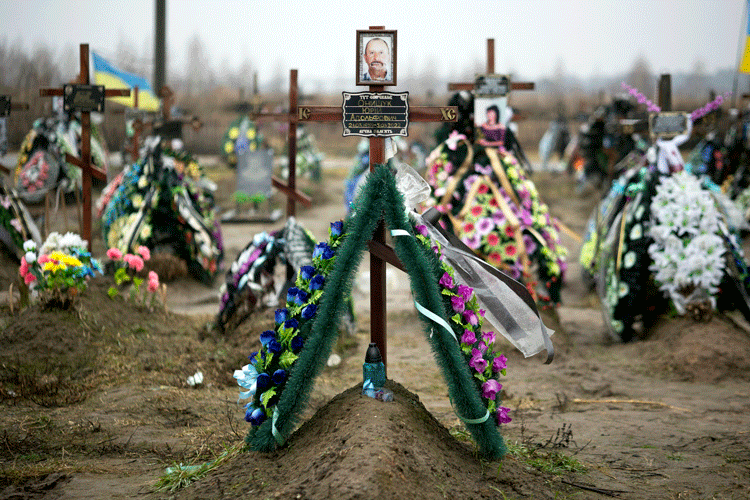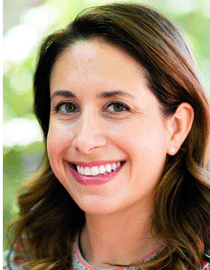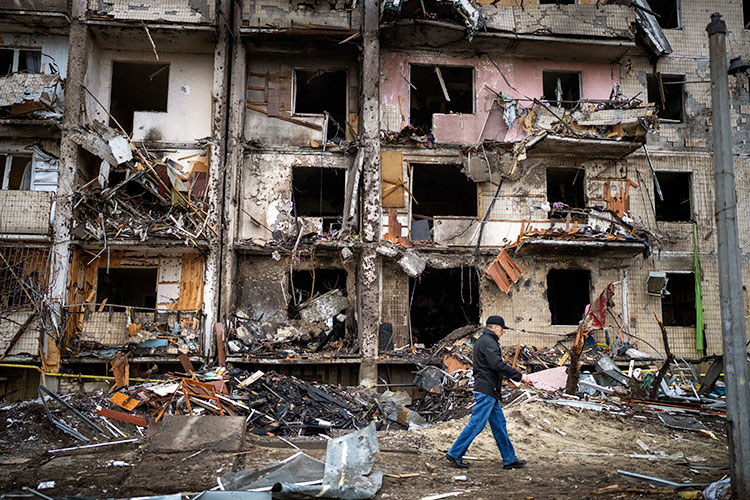In Ukraine, Berkeley experts are shaping the legal fight against war crimes
Protocol will assure that images from drones, satellites and millions of smart phones will be solid evidence in future trials
February 21, 2023

In Bucha, near the Ukrainian capital of Kyiv, Russian troops apparently committed mass killings of civilians after their invasion. Ukrainian investigators are using the Berkeley Protocol, developed at the School of Law’s Human Rights Center, to analyze and preserve digital evidence of war crimes. (AP/Sipa photo by Raphael Lafargue)
Nearly every day for almost a year, reports have emerged of atrocities committed by Russia in Ukraine: the abduction and deportation of children, the bombing of hospitals and schools, systematic rape and mass killings. Some analysts argue that Russia is committing genocide against its democratic neighbor.
Already, Ukrainian law enforcement officials and NGOs are preparing for war crimes trials — and almost from the start of the war, their efforts to collect evidence have been guided by digital-age legal standards developed under the leadership of the Human Rights Center at the University of California, Berkeley, School of Law.

The Berkeley Protocol on Digital Open Source Investigations, co-published by the Human Rights Center at the UC Berkeley School of Law and the United Nations, will be launched formally later this year.
The 100-page Berkeley Protocol on Digital Open Source Investigations, co-published by the Human Rights Center and the United Nations, will be launched formally later this year. Today, though, Ukrainians are using it as a guide to help assure that images from drones, satellites and millions of smart phones, along with countless social media posts, will be admissible evidence that meets the strict standards of international judicial bodies.
Alexa Koenig, co-director of the Human Rights Center, sees the Berkeley Protocol as “a game-changer” for human rights prosecutions. The document has a rigorously legal orientation, but it also has practical applications for Ukrainian citizens and other people in other countries who want to hold perpetrators accountable for human rights violations and war crimes.
The challenge, Koenig said, that Ukrainian law enforcement investigators, human rights activists and journalists are gathering digital evidence of war crimes, but they sometimes lack the training or experience to assure that the data meets rigorous standards for accuracy and authenticity required in international judicial cases.

Alexa Koenig (UC Berkeley Human Rights Center photo)
“How do we help them understand that if they want this kind of information to have weight in court, they need to be protecting the integrity of the data from the outset so that we don’t lose this opportunity?” she asked.
Not since World War II has Europe been the setting for such brutal and wide-ranging human rights violations — and never in human history has the technology existed to allow for extensive, detailed documentation of the crimes virtually in real time.
In Ukraine today, anyone with a smart phone can be collect evidence to support human rights investigations. And that, Berkeley officials say, is both an opportunity and a challenge.

Lindsay Freeman (UC Berkeley Human Rights Center photo)
If data is gathered casually, without rigorous documentation of specific details such as time, place and source, then it will have little value in a war crimes trial at the International Criminal Court (ICC). At the same time, technology makes it relatively easy for combatants to inject disinformation into these streams of data, clouding the waters and leaving even legitimate evidence open to suspicion.
Official investigators coming into such a chaotic situation might struggle to manage the tides of data, to “figure out where is the signal in the noise, and to verify it,” said Lindsay Freeman, director of the Technology, Law and Policy program at the Human Rights Center. “The Berkeley Protocol provides high-level advice for managing that environment.”
And in working with civil society groups throughout Ukraine, Freeman said, the center’s staff has been “developing on-the ground methodologies for how to sort through this environment.”
Grave violation of rights, but poor quality evidence
The Berkeley Protocol emerged gradually, over a decade or more, propelled by a powerful wave of technological change and geopolitical turmoil.

Russia’s repeated, lethal missile strikes on civilian, non-military targets in Ukraine — including shopping areas, apartment buildings, schools and hospitals — have led many experts to accuse the country of war crimes. (Credit: Emilio Morenatti /AP)
Koenig recalled period in the early 2010s, when the human rights community realized that a high proportion of cases considered at the ICC were collapsing almost before they’d begun. The Human Rights Center sent a Ph.D. student to The Hague to study the situation.
The problem, the researcher discovered, was evidence — specifically, poor quality evidence. Too much of it was secondhand accounts from reports and studies, though written by respected organizations. And even the most harrowing first-person accounts provided by survivors often lacked firm corroborating detail.
The research inspired a multi-year process, centered at Berkeley, that drew in over 100 experts in international law, judicial procedure, human rights, history, technology and other fields. Some were from the U.N. and the ICC, and some from social media companies. Others had prosecuted war crimes cases in Cambodia and Kosovo. Some were diplomats with expertise in war crimes, while others specialized in cybersecurity or the impact of war crimes targeting women.
Their discussions and workshops unfolded at a historic inflection point: The Internet was an established force. Smart phones were proliferating. Social media like Facebook and Twitter were still young, but increasingly popular worldwide. And in Syria, a savage effort by Syrian President Bashar al-Assad to crush a civil uprising was generating storms of global outrage — and oceans of open source evidence that the regime was abusing human rights and committing war crimes.
Then, in 2014, at about the same time as the Human Rights Center was holding workshops on open source evidence with the ICC and others, Russia illegally annexed Ukraine’s Crimea region.
‘This is exactly why we created the protocol’
In late 2020, working with the UN Office of the High Commissioner for Human Rights, the center released the English-language version of the Berkeley Protocol. In August 2021, Berkeley’s Human Rights Center began working on a Ukraine-related investigation and consulting with Ukrainian NGOs on Russian cyberattacks.
When Russia launched its unprovoked invasion on Feb. 24, 2022, the Ukrainians put the Berkeley Protocol into action.
We have a team of prosecutors who register evidence of war crimes available in open sources,in line with Criminal Procedure Code, the Berkeley Protocol on Digital Open Source Investigations standards,so that such evidence is admissible before international judicial institutions. pic.twitter.com/3MGi5ZqlJw
— Iryna Venediktova (@VenediktovaIV) March 9, 2022
“It was immediately a resource for them,” Freeman said. “They created an unofficial translation (into Ukrainian) and published it and shared it — they did that on their own.”
The Human Rights Center then posted the translation on its website. Staff did a virtual training for a group of NGOs operating under the umbrella of the Ukraine 5 AM Coalition (named for the hour of the invasion on Feb. 24.)
Even Ukrainian police began using the protocol, Freeman said. Iryna Venediktova, then Ukraine’s prosecutor general, endorsed it, too.
“We have a team of prosecutors who register evidence of war crimes available in open sources, in line with Criminal Procedure Code (and) the Berkeley Protocol … so that such evidence is admissible before international judicial institutions,” Venediktova tweeted in the weeks after the Russian invasion.
Meanwhile, Freeman explained, Russian forces have been communicating on Telegram and other social media channels, providing an additional stream of evidence for investigators.
And the relevant data needs to be curated, verified and securely stored for future trials.
“This is exactly why we created the protocol — to strengthen the evidence needed to secure justice in the face of atrocity,” Koenig said in the early days of the invasion.
Bringing order to a complex communication battlefield
Before the invasion, “we thought that Syria was the most documented conflict in history,” Freeman said. “Ukraine has just blown that out of the water. The number of people with phones, the number of drones, the amount of satellite imagery coverage … there’s so much visual imagery coming out.”

War crimes investigators in Bucha, Ukraine, study bodies exhumed from the site of a mass burial in April 2022, less than two months after the Russian invasion. (Photo by National Police of Ukraine via Wikimedia Commons)
But that volume creates its own challenges. Weak evidence needs to be filtered out. Investigators especially have to beware of disinformation and “deepfake” videos that have been digitally manipulated to create false impressions.
“This is a conflict where the information space itself is a battlefield,” Freeman said. “It’s information warfare, the fight for influence and the use of disinformation, different types of psychological operations — we’re seeing how the Russians use that. But then the Ukrainians also have shown they’re quite good at that themselves.
“So it’s a really, really complex information environment.”
In effect, Freeman explained, Ukraine has become the first test case for the Berkeley Protocol. The war and the effort to document war crimes allow important on-the-ground evaluations of its standards and methods.
But Freeman sees another development of great potential importance, both for Ukraine and in future conflicts: The ICC, the Ukraine government and local investigators are beginning to use a common language, derived from the protocol, about human rights violations and war crimes and how they are documented.
“We already see the terminology is certainly helping different groups — police, civil society, international lawyers coming in — to speak to each other,” she said. “That creates a sort of flow of understanding between the many different justice and accountability actors in the field.”
The Berkeley Protocol is shaping a new international landscape
The Berkeley Protocol is almost certainly reshaping the legal landscape for human rights in a time of war — both for Ukraine and future conflicts worldwide.
But how exactly will these efforts play out for the people of Ukraine as they press for accountability and reparations? That remains to be seen. The war is still raging, and its outcome is uncertain. Perhaps the best they can hope is that, in legal terms, the protocols help to strengthen some cases.

A maternity hospital in Ukraine’s Zaporizhzhia region was hit by Russian rockets last November. An infant was killed in the blast, and a mother and a health care worker were injured. Two doctors were pulled from the rubble. (Photo by National Police of Ukraine via Wikimedia Commons)
After long experience in this field, Koenig is a realist. Typically, such legal cases are complex and take years to wend through the justice system. Even when the perpetrators of crimes are identified, Russia may shield them from prosecution. Many of these cases, even cases of shocking brutality, might never make it to trial.
“I think courts have an important role to play in helping people make sense of what’s happened and who may be most responsible,” Koenig said. “At the same time, what people might need in the aftermath of conflict is for their house to be rebuilt or schools reopened for their children, or their immediate humanitarian needs met.
“We have to make sure that those of us working in the legal space are humble enough to recognize that our tool is not always the right tool to meet those needs.”
But even outside the legal sphere, she said, the protocol may provide crucial support for nations, communities and people as they try to recover and rebuild.
For example, she said, people may need a reliable record of what happened during the war, even if the record does not lead to prosecution.
“People will want to build the histories of their communities and what they’ve suffered and witnessed,” Koenig said. “This kind of data can become almost like a digital museum that they can explore, to make sense of something that will often feel senseless.”
That signals a deeper rationale for the Berkeley Protocol: In the life of a community, long after the war ends, reliable data may support justice in various forms.
“It’s important that we never lose sight of, or break out of, conversations with the people who are most impacted,” she said. “The objective is that we come ever closer to getting the forms of justice demanded by those who’ve been most affected by conflicts.”